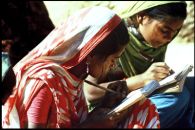Loading...
Loading...
 |
| Two young mothers learning to write in a literacy class conducted by Literacy House at a village near Lucknow, in India. (Copyright: United Nations Photo / Flickr) |
"In the last five to six decades in education, as in all walks of life, we have moved from cooperation to competition as a model for living," writes Asfa M. Yasin of the PSS Central Institute of Vocational Education in Bhopal, India. In the interests of developing an educational system that promotes values such as self-sustenance, happy and healthy living in a safe and pollution-free environment, India's National Council of Educational Research and Training proposed revolutionary changes in its National Curriculum Framework (2005), including the integration of productive work with academic subjects.
Based on Ghandian philosophy, "work-centred education" (WCE) would assign a central place for learning practical, work-related skills within the school system. In the process, students would develop an understanding of scientific and mathematical concepts, geographical, social and environmental issues as well as generic competencies, notes Yasin. WCE would provide opportunities for students to undertake productive work that not only unfolds their potential, creativity and innovation but also illustrates the "world of work" that exists around them.
Among its potential benefits, a WCE curriculum would replace rote learning with experiential learning, make learning more enjoyable, provide opportunies for enhancing creativity and innovation, facilitate employment, and instil values such as respect for manual work and workers, adds Yasin. Based on their age and stage of education, students could be assigned to classes focused, for example, on learning a wide range of food processing, agriculture, technology, or arts and crafts skills.
The institutionalization of WCE in the school system "creates scope to ensure that from toddlers to teenagers, our youngsters are well equipped to handle life as it exists today and give them space for forging a desired future," states the author.
For more information about each research, please contact:
Asfa M. Yasin
Agricultural Division
PSS Central Institute of Vocational Education (PSSCIVE), NCERT
131, Zone-II, M. P. Nagar
Bhopal - 462011 (MP)
INDIA
Email: asfayasin@rediffmail.com
Tel: + 91 7552 55 8160 ; Mobile: +91 94 253 722 83)
About Pertanika Journal of Social Sciences & Humanities (JSSH)
Pertanika Journal of Social Sciences & Humanities (JSSH) is published by Universiti Putra Malaysia in English and is open to authors around the world regardless of nationality. It is published four times a year in March, June, September and December. Other Pertanika series include Pertanika Journal of Tropical Agricultural Science (JTAS), and Pertanika Journal of Science & Technology (JST).
JSSH aims to develop as a pioneer journal for the social sciences with a focus on emerging issues pertaining to the social and behavioural sciences as well as the humanities. Areas relevant to the scope of the journal include Social Sciences-Accounting, anthropology, Archaeology and history, Architecture and habitat, Consumer and family economics, Economics, Education, Finance, Geography, Law, Management studies, Media and communication studies, Political sciences and public policy, Population studies, Psychology, Sociology, Technology management, Tourism; Humanities-Arts and culture, Dance, Historical and civilisation studies, Language and Linguistics, Literature, Music, Philosophy, Religious studies, Sports.
The journal publishes original academic articles dealing with research on issues of worldwide relevance. The journals cater for scientists, professors, researchers, post-docs, scholars and students who wish to promote and communicate advances in the fields of Social Sciences & Humanities research.
Website: http://www.pertanika.upm.edu.my/
The papers are available from the following links: http://bit.ly/1rlQeaR
For more information about the journal, contact:
The Chief Executive Editor (UPM Journals)
Head, Journal Division, UPM Press
Office of the Deputy Vice Chancellor (R&I)
IDEA Tower 2, UPM-MDTC Technology Centre
Universiti Putra Malaysia
43400 Serdang, Selangor
Malaysia.
Phone: +603 8947 1622 | +6016 217 4050
Email: nayan@upm.my
Press release distributed by ResearchSEA for Pertanika Journal.
Source: Pertanika Journal
Copyright 2014 ACN Newswire. All rights reserved.
Loading...
Loading...
© 2024 Benzinga.com. Benzinga does not provide investment advice. All rights reserved.
Posted In: Press Releases
Benzinga simplifies the market for smarter investing
Trade confidently with insights and alerts from analyst ratings, free reports and breaking news that affects the stocks you care about.
Join Now: Free!
Already a member?Sign in